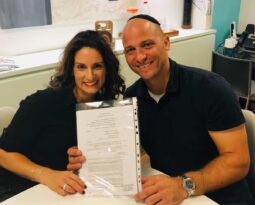When purchasing a pre-owned home, ie. residential property in Israel that is being resold, it is customary for the purchaser’s attorney to conduct negotiations with the vendor’s attorney by discussion, exchange of correspondence, and drafts of the contract of sale which reflect each party’s concept of how the transaction should be structured.
The following is a selection of some of the more critical issues that a purchaser’s attorney will address during the process of negotiating a real estate transaction in Israel:
- Current ownership of the second-hand property: Surprisingly enough, some sellers have yet to complete the registration of their ownership of the property being sold. In other cases, the “seller” is actually a representative of the actual owner, in which case it is imperative to ensure that the person has been granted a legally valid power of attorney. The purchaser’s attorney’s job is to ensure that the seller is, in fact, in a position to sell the property and convey title as well as examining the nature of the rights owned by the vendor (freehold, long-term renewable leasehold, etc.). Accordingly, the first document the attorney requests from the vendor is an extract of title (nesach) from the Land Registry (Tabu) or a certificate of ownership (ishur zechuyot) from the registration company and/or the Israel Lands Administration.
- Encumbrances on the property: Once ownership of the pre-owned home has been confirmed, the attorney must then determine how to deal with any mortgages, liens, or other rights of third parties that may be registered on the property. The existence of such encumbrances will usually appear on title though there are exceptions. Mortgages, liens, etc., do not necessarily prevent a sale of the property. However, adequate provision (financial or otherwise) must be made for such rights to be removed from the property prior to the transaction being completed. Customarily, the contract provides for the vendor’s mortgage to be paid off directly by the purchaser, with such payment being set off against the purchase price. This procedure enables the purchaser to clear title himself before paying the full purchase price, thereby ensuring that he will receive clear title.
- Fixing the payment schedule: As opposed to other countries in which 10% of the purchase price is paid at the signing of the contract and the balance when the purchaser receives the keys, Israeli transactions often employ a series of payments. The first payment of at least 10% of the purchase price is paid at the signing for a second-hand home. Thereafter, the purchaser will pay one or more additional installments with the final installment being paid when possession of the property is delivered to the purchaser. Various factors come into play when determining the payment schedule, among them: when the purchaser’s funds become available; the purchaser’s desire to avoid paying rent and repaying his mortgage at the same time; the vendor’s need for funds to finance his purchase of another property; discharging the vendor’s mortgage from the property and procuring the certificates required to transfer title.
- Withholding part of the purchase price: In light of the need to procure various certificates to transfer title, including certificates confirming payment of taxes and municipal rates, the practice of withholding part of the purchase price or placing it in escrow until the certificates are delivered has become commonplace. In this way, a purchaser is assured that if the seller of the second-hand home does not pay his taxes, money has been set aside to cover any outstanding payments and enable the purchaser to be registered as the owner of the property. Enquiries can be made with the authorities prior to the signing of the contract to check whether various taxes or levies apply to the property and if they have already been paid by the vendor.
- Removal of seller’s mortgage: As mentioned above, an essential consideration for an attorney is ensuring that the seller’s mortgage can be removed from the property either prior to or concurrently with the purchaser receiving his mortgage funds. Mortgage banks will not release mortgage funds for a purchase if the property has a lien or other mortgage registered on title. However, they will agree to use the mortgage funds they are providing to discharge the existing mortgage or lien if they receive an undertaking from the seller’s bank or another creditor to remove the existing mortgage upon receipt of the outstanding debt. The key here is to ensure that the amount of the existing mortgage or lien does not exceed the total balance of funds remaining to be paid to the seller.
- Power of Attorney: It is critical to ensure that all documents required to register the purchaser as the owner of the property are delivered no later than the date that the final payment is made to the seller. At such time the seller of the second-hand property also delivers an irrevocable power of attorney authorizing the purchaser’s attorney to complete the transfer of ownership. This power of attorney ensures that in the event of the seller being unable or refusing to sign any additional documents that may be required once he has received all his money, the purchaser’s attorney will be able to do so on the seller’s behalf.
Obviously, each transaction has its’ own unique issues that need to be addressed and it is therefore recommended that a prospective purchaser of a home that was pre-owned take an active interest in the conduct of the negotiations and the specific details which arise. In this manner, a purchaser can enter the transaction feeling confident of his decision and command of the issues.

Aryeh Rachlin is a partner in the Jerusalem law firm of Rachlin & Olman Law Offices. He has almost three decades of experience representing clients in real estate transactions in Israel. You can contact Aryeh by emailing him at [email protected].




